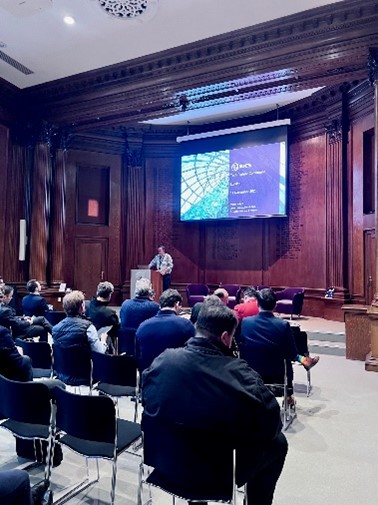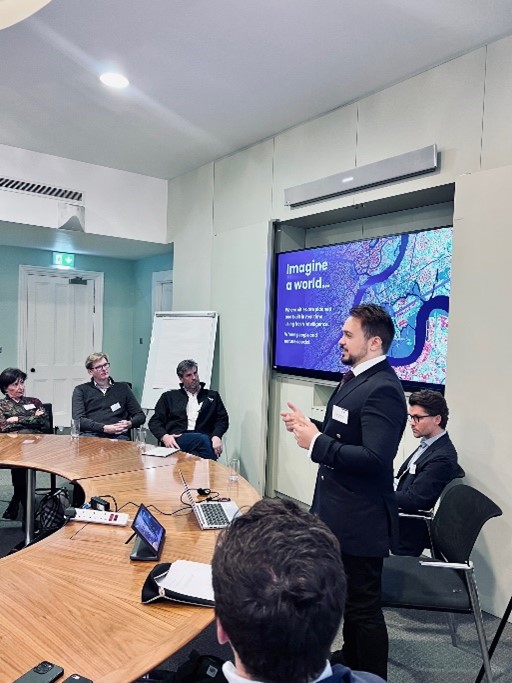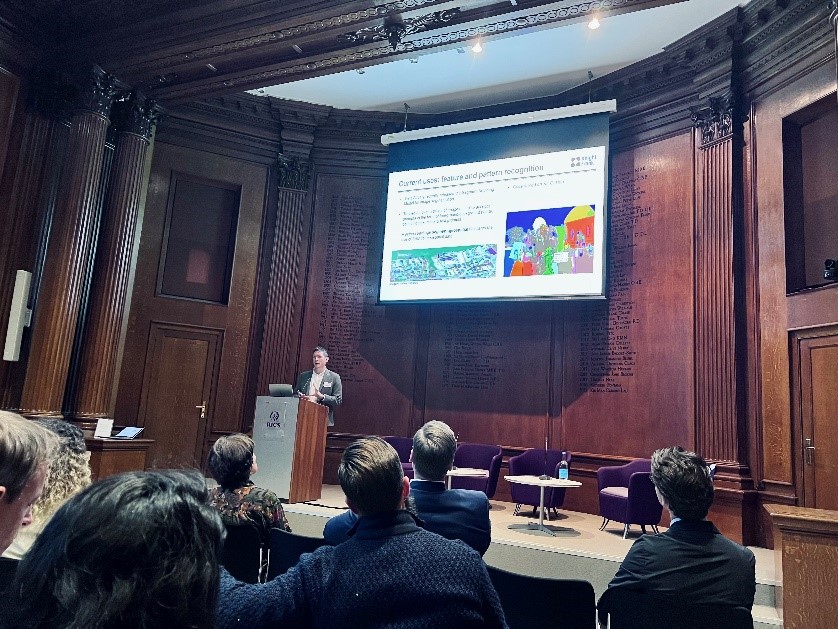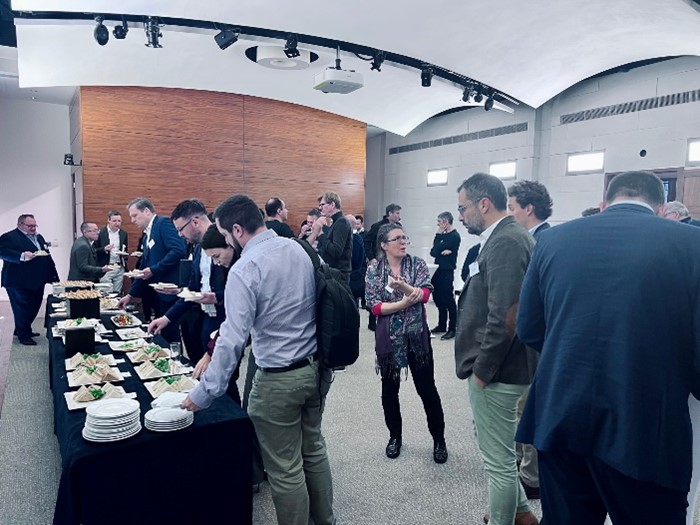In November 2023, the first RICS Tech Partner Conference was held at RICS headquarters in Parliament Square, London. This event served as a collaborative platform, bringing together Tech Partners from various practice areas to explore the impact of technology across the built environment and natural environment. Throughout the day, discussions and presentations revealed key themes highlighting the importance of data, technology to the sector brought to live with examples of their real-world applications.


Digital transformation was the overarching theme of the day and the conference began with a session entitled “Digital Transformation in Construction". Speakers from Preconvision, Raildiary, Sektor and Magnitude QS, discussed the challenges and opportunities across project management, data capture, data-driven decision-making, system integration and the use of 2D, 3D, and 4D visualisation to support design and scheduling.
A parallel session addressed the evolving landscape of building surveying. "Building Surveying in a Digital Age" focused on the increasingly critical role of technology and led by Alan Milstein, Director at Skyline Surveyors, and Matt Nally, Founder of Survey Booker, explored how advanced digital capabilities are driving efficiency and accuracy across the sector. The session went on to look at how the integration of digital solutions is streamlining processes and minimising administrative tasks in building surveying practices.
The session “The Role of FinTech within the Built Environment” examined the importance of property data for the finance and insurance sectors and some of the innovations that have emerged from the Fintech revolution that have the potential to impact and reshape real estate as an asset class. Speakers from Verseprop, GeoSmart Innformation, and ScanSanProperties, explored how tokenisation holds the potential to enhance liquidity in the real estate market and provided insights into the intersection of finance and real estate highlighting the importance of quality property data for lenders and insurers.
Ransomware, data theft and fraudulent wire transfers are just some of the risks facing organisations right across the property sector. Addressing the concerns around cybersecurity that face the sector, Marie-Noelle Brisson, Co-Founder of CyberReady, took the lead on the session "Cybersecurity Challenges: Insights and Strategies" which covered the role of data governance as a foundational element for robust cybersecurity. The session provided valuable insights on how to align governance frameworks with dynamic cybersecurity practices and how to ensure regulatory compliance in the complex landscape of the built environment across multiple jurisdictions.
As the sector works towards achieving ‘net zero’ the event dedicated two sessions to address issues around Environmental, Social, and Governance (ESG) and the circular economy across the whole land and property life cycle.
During the session “ESG in Real Estate & Green Land Management", speakers from Skylark, LifeProven and Optimal Cities discussed how to integrate ESG principles across land and property. This session underscored the sector's commitment to delivering sustainable built environment, and the key role that technology plays in achieving this goal. Sholto Moger, CEO of Skylark, stated, "Technology and digital solutions will be among the critical enablers to usher in the new era of real estate."

The conference then moved on to consider sustainable construction practices during the session “Circular Economy within Construction”. Brittany Harris, CEO of Qualis Flow, showcased their solution that enables construction projects to track and manage the carbon emissions associated with every product entering the site demonstrating how easy to use technology can play a pivotal role in steering the construction industry towards a more sustainable future.
A central theme throughout the conference was the importance of comprehensive data management. Many of the sessions highlighted the importance of the digitisation of quality data in supporting various stakeholders across residential and commercial property, including property owners, occupiers, and the emergency services. In the session “Better Data: Digital Twins, Building Passports and Property Logbooks”, speakers from Building Passport, Chimini and Novoville shared their solutions on how Property Logbooks and Building Passports are digitising property data to support multiple use cases such as home buying and selling, property retrofitting, and fire safety.
The use of data was also explored in the session "Streamlining Property Management, Maintenance, and Tenant Services" in which speakers explored the digitisation and automation of data and processes across property management to enhance the efficiency and customer experience when managing and maintaining diverse property portfolios. Speakers from Rentancy, Gigabyte Software and PropertyInspect, shared their expertise providing valuable insights in how to improve property management practices and deliver enhanced experiences for tenants.
As anticipated, the topics of Artificial Intelligence (AI) and automation dominated discussions throughout the day. In the session "Promise or Peril: How are we talking about AI in Real Estate?" Ian McGuinness, Head of Analytics at Knight Frank, provided insights into the current and emerging applications of AI. Ian highlighted the need for pragmatic analysis, focusing on concrete needs while considering the limitations, biases, and ethical implications of using AI in all its forms.
In the session “AI Ethics: Navigating the challenges and opportunities” speakers explored the topic of AI ethics and regulation. Led by Holistic AI, Ark, and Built AI, they explored how ethical AI can reshape the real estate landscape and address key industry challenges. Throughout the day speakers shared their thoughts the implementation and effects of AI across their industries.

The session, “Advancements in Automated Valuation Models (AVMs) and Valuation Automation” consider the impact of AI, data, and automation to the valuation process. Led by speakers from Propsmart, Evalio and Income Analytics, we heard how AVMs can be designed to work with valuers and provide the necessary levels of transparency that is needed to rely and interpret their output in a commercial context. We also learnt how multiple datasets can support quicker and accurate development appraisals and how AI is providing bond like ratings for commercial property tenants to improve valuation, and asset and portfolio risk management.
To wrap up the day, Andrew Knight discussed RICS' focus for 2024 and beyond. Attendees had the opportunity to learn about the suite of RICS and International Standards that Tech Partners can support, helping to drive adoption across the built and natural environment. Andrew provided valuable insights into the strategic direction of RICS and the collaborative efforts with Tech Partners to advance standards and innovation across the industry.
This first in person RICS Tech Partner Conference 2023 facilitated discussion and collaboration between the property and technology sectors. The platform served as a space where Tech Partners could share insights and engage in an exchange of knowledge. As the sector continues to navigate the evolving digital landscape, this collaborative space will continue to allow Tech Partners to collaborate, learn, and collectively shape the future of the built and natural environment through AI, data, and technology.

Aaliyah Pollock
Data and Tech Analyst













